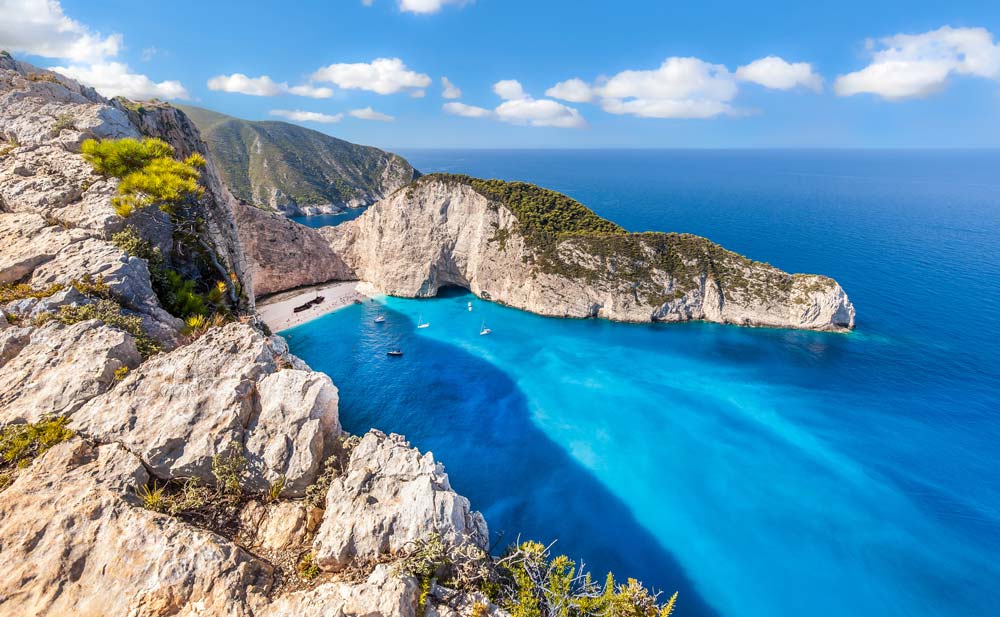Zakynthos, Greece
Zakynthos, Greece

The island-municipality is named after the son of a legendary Arcadian chief and a son of Zeus, Dardanus. The Venetians nicknamed the island “the flower of the East”, and it possesses many beautiful beaches and rich vegetation with agricultural products such as citrus fruit, olive oil, grapes and currants. It is known for being mentioned in Greek Mythology as the island where Dardanus’s son Zakynthos first inhabited. Zakynthos is also referred to its Venetian name “Zante”.
As expected of any part of Greece, the culture and history of Zakynthos is rich and extensive, dating back to the Paleolithic Age (Old Stone Age). Oldest mentions of the island date back to the Mycenaean period, and ancient Greek poet Homer included Zakynthos in his famous works, the Odyssey and the Iliad. Zakynthos was the first established independent democracy in Greece for 650 years prior to several invasions that led to Byzantine rule. The Kingdom of Sicily and the Ottoman Turks attempted to rule Zakynthos, however it was the Venetian Republic that maintained authority, despite subsequent Ottoman raid attempts and little peace experienced internally, as the existence of classes led to the first social revolt in modern history, The Rebellion of the Popolari.
The French were awarded Zakynthos when the Venetian Republic was disbanded in 1797 as per the Treaty of Campoformio. That is, until the Russo-Turkish fleet invaded the island in 1798 and the Septinsular Republic was formed under the Ottoman empire. The Septinsular Republic was eventually ceded to Napoleon’s First French Empire, however the Treaty of Paris resulted in the gradual shift of rule to the British after the Greek War of Independence. Around 1848, radicals gave rise to varied Ionian efforts to unite with the Kingdom of Greece, which would be granted in 1864 as Britain sought to stabilize rule for George I.
The World Wars would take a toll on Zakynthos, with emigration and starvation reducing the population in the First War, and joint efforts from Nazi Germany and Mussolini’s Italy would result in Italian rule. When fascism fell in Italy, Germans took the Ionian Islands for one year. Most interesting was Mayor Karrer and Bishop Chrysostomos of Nazi Germany, who refused orders and protected the Jewish community in Zakynthos, which resulted in the survival of all Jews on the island. The two would receive honors and be commemorated with statues in the town’s synagogue.
Unfortunately, Zakynthos became subject to major earthquakes in 1953, and a few subsequent ones which caused great destruction, leaving only 3 important buildings: the church of St. Nicholas, St. Dionysios Cathedral, and the National Bank building.
Tourism truly thrives as there are many beautiful splendors in Zakynthos. The island is well known scuba diving in surrounding caves and for Navagio Beach, which name comes from a famous shipwreck in 1980. Tourists enjoy Porto Limnionas Beach, Blue Caves, Keri Caves, Turtle Island, Banana Beach, and the endangered Loggerhead Sea Turtle habitat, the Zakynthos Marine Park in the Bay of Laganas. Zakynthos is additionally interesting because the cuisine isn’t typically Greek: Rich, thicker sauces accompany dishes that incorporate more poultry and meat than other Greek cuisine. There is also a rich wine culture on the island; Comoutos Winery is one of the oldest running wineries, established in 1638, and the island’s most famous wine, Verdea, is one of the only two wines in Greece under the PGI Category. Guests are urged to explore the Venetian castle on Bochali Hill, to get a panoramic view of Zakynthos Town.
Yachting Land Adventures
Voyages
Testimonials
The crew was fabulous, we were treated like kings & queens, very personal, like no other experience we've ever had. See you next year and every year thereafter. Mr & Mrs Michael AmbroseSugar Land, Texas
This was way over our expectations. All the way top service, very nice personnel. We'll be back! Mr. Henning VillangerSweden